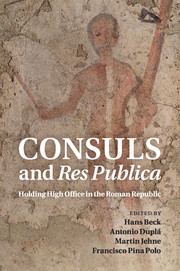Book contents
- Frontmatter
- Contents
- Preface
- Contributors
- The republic and its highest office: some introductory remarks on the Roman consulate
- Part I The creation of the consulship
- Part II Powers and functions of the consulship
- Chapter 4 Consular power and the Roman constitution: the case of imperium reconsidered
- Chapter 5 Consuls as curatores pacis deorum
- Chapter 6 The Feriae Latinae as religious legitimation of the consuls’ imperium
- Chapter 7 War, wealth and consuls
- Part III Symbols, models, self-representation
- Part IV Ideology, confrontation and the end of the republican consulship
- Bibliography
- Index of persons
- Subject index
Chapter 7 - War, wealth and consuls
from Part II - Powers and functions of the consulship
Published online by Cambridge University Press: 07 September 2011
- Frontmatter
- Contents
- Preface
- Contributors
- The republic and its highest office: some introductory remarks on the Roman consulate
- Part I The creation of the consulship
- Part II Powers and functions of the consulship
- Chapter 4 Consular power and the Roman constitution: the case of imperium reconsidered
- Chapter 5 Consuls as curatores pacis deorum
- Chapter 6 The Feriae Latinae as religious legitimation of the consuls’ imperium
- Chapter 7 War, wealth and consuls
- Part III Symbols, models, self-representation
- Part IV Ideology, confrontation and the end of the republican consulship
- Bibliography
- Index of persons
- Subject index
Summary
That war was a consul's primary road to riches seems beyond question. Ideological and legal impediments precluded direct aristocratic involvement in commerce and finance while the profits in commercial agriculture were surprisingly slim. Despoiling the republic's provincial subjects had by the first century become an important means of aristocratic self-enrichment. But even here, the money to be made could pale in comparison to the spoils of war. Pompey returned from his eastern conquests “richer than Crassus,” indeed the richest Roman ever, at least until Caesar began plundering Gaul. But Pompey and Caesar were exceptional in this regard as in so many others, and the question is rarely posed, “How much money did ordinary consuls typically make out of successful wars?” Put in these terms of course the question is unanswerable. We lack even the most basic data out of which to begin formulating an answer. But it may be possible to approach the problem from a somewhat different angle by asking, “What were the limits on a consul's or proconsul's ability to profit from the wars he waged?”
The existence of such limits is no longer in doubt, despite the long-standing belief that generals were free to help themselves liberally to that portion of the spoils termed the manubiae and to use it as they pleased: to build monuments in fulfillment of vows to the gods for victory, to present games as acts of thanksgiving to the deities, to distribute donatives to their soldiers when they celebrated a triumph, or simply to line their own purses and those of their favorites. However, while it is clear that the Romans drew a distinction between the praeda generally, which was whatever the soldiers looted and which belonged to them, and the manubiae, Churchill has argued persuasively against Shatzman that generals did not “own” the latter. Churchill draws attention to a passage from Polybius praising Scipio Aemilianus’ behavior at the sack of Carthage in 146. Scipio, the historian notes, “took absolutely nothing from it [i.e. the booty] for his own private use, either by purchase or by any other manner of acquisition whatever” and he “not only abstained from the wealth of Carthage itself, but refused to allow anything from Africa at all to be mixed up with his private property.” As Churchill points out, the fact that Polybius believed that Scipio would have had to resort to purchase or unspecified “other means” to acquire anything out of the spoils from Carthage is completely at odds with the notion that, as the victorious general, Scipio in any sense “owned” the manubiae from his victory. Likewise, the distinction Polybius draws between Scipio's personal property and “anything from Africa” strongly implies that spoils from that country did not already belong to Scipio by virtue of their status as manubiae. The difference between manubiae and a general's personal property is further emphasized in an exchange between Aemilianus’ great uncle, Scipio Nasica, and the senate during the latter's consulship in 191. Nasica asked the patres for funds to celebrate games that he had vowed as praetor three years before in connection with a victory in Spain. To this demand the senators responded that Nasica should fund the games from his manubiae, if he had kept back any money for this purpose; otherwise he himself should pay for them at his own expense. Again, it is difficult to make sense out of this episode if the manubiae from Nasica's victory were identical with his personal property.
- Type
- Chapter
- Information
- Consuls and Res PublicaHolding High Office in the Roman Republic, pp. 133 - 158Publisher: Cambridge University PressPrint publication year: 2011
- 1
- Cited by



